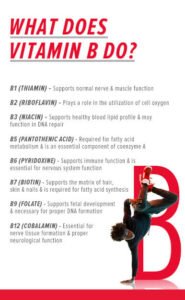The Essential Power of B Vitamins for Overall Health

Vitamins are vital for a healthy diet, and among them, B Vitamins have become known to provide great health benefits to the human body. The eight B Vitamins (B1, B2, B3, B5, B6, B7, B9, and B12) are often found in fortified foods and supplements. As a water-soluble vitamin, B Vitamins are not stored in the human body and must be consumed in adequate amounts every day. Taking into consideration their important role in metabolism and other metabolic systems, here are five health benefits associated with B Vitamins.
First, B Vitamins are great for providing energy. During a metabolism process, carbohydrates, proteins and fats are broken down into a type of energy called glucose. B Vitamins assist in the process of breaking down these nutrients into glucose for an efficient energy use throughout the body. This energy helps individuals stay alert and focused instead of drained and tired throughout their day.
Second, B Vitamins help with red blood cell creation. Red blood cells are needed to reduce the risk of anemia and the fatigue that accompanies it. Furthermore, they prevent oxygen deprivation within the body, which is used to help metabolic systems. Vitamin B12 is especially important in this process since it helps produce healthy red blood cells that can transfer essential elements to the entire body.
Third, B Vitamins are essential in the development of a strong immune system. B Vitamins also help regulate the inflammatory responses of the body, which is necessary for a strong immune system. Vitamin B6, for example, helps produce white blood cells, which are responsible for fighting off infections. Vitamin B9 also helps in this process by producing at least five different types of white blood cells.
Fourth, B Vitamins play a part in the prevention of birth defects. Vitamins B6, B9, and B12 all work together to produce and strengthen healthy cells for a growing baby in the womb. Additionally, taking in adequate amounts of B Vitamins, especially during the first trimester, can lower the risks of neural tube defects.
Finally, B Vitamins have roles in preventing heart disease. B Vitamins, specifically vitamin B3 and B12, reduce the levels of homocysteine in the body. Homocysteine is an amino acid that, in high concentrations, can cause damage to the arteries and increase the risk of suffering a heart attack or stroke.
All in all, B Vitamins play an essential role in overall health and wellbeing. From providing energy to developing healthy red blood cells and promoting proper neural development in infants, B Vitamins are an important part of keeping the body in balance. Additionally, they offer exclusive benefits to prevent heart disease and maintain a strong immune system. For the best results, individuals should be sure to include adequate amounts of B Vitamins in their daily diet.

Comments